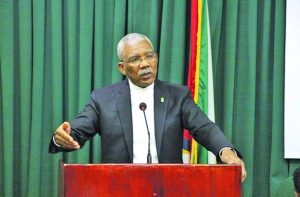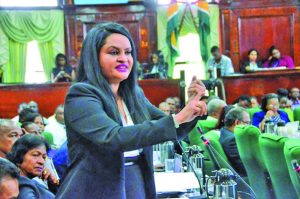Marijuana possession
– MP notes need for drug rehabilitation support services
– Rights commissioner urges clarity on lawful quantity
By Jarryl Bryan
The President’s recent announcement that custodial sentences for possession of small amounts of marijuana would be removed from the statute books is being greeted with various reactions by some stakeholders.
While they agree the measure is good in principle, questions are being raised in regard to the execution of this plan.
In an interview with this publication, the Opposition point woman on health, Parliamentarian Dr Vindhya Persaud, expressed the belief that while removing custodial sentences is a step in the right direction, support services such as drug

rehabilitation and treatment centres are wholly lacking.
“I don’t support the use of marijuana whatsoever, and even though countries have legalised marijuana, there is so much debate in the process about the properties of marijuana. But instead of persons being sentenced to (jail), they can have rehabilitation,” Persaud, also a medical doctor, posited.
“This is the problem. There are Acts that have been put into place and the infrastructure to actually make them work is not in place. If we go this way, while it is something that can be beneficial, the regulatory infrastructure and the services to implement it (are lacking),” Persaud said.
Former Vice President of the Guyana Rastafari Council and Rights of the Child Commissioner, Nicole Cole, welcomed the proposed initiative, but expressed concern that the term “small amounts” is yet to be quantified.
“I welcome the positive promise to remove custodial sentences for the possession of small amounts of marijuana,” she said, going on to note that “the President is

Dr Vindhya Persaud
still to commit to the quantity that constitutes ‘small amounts’.”
Cole questioned whether Government’s definition of small would amount to 15 grammes, 25 grammes, 56 grammes or 3 ounces. She stressed that such a law must be as unambiguous as possible.
Cole also noted that, for too long, members of the Rastafari community have been denied their rights when it comes to personal use of marijuana on religious grounds. This, she pointed out, is despite the fact that the right to religion is enshrined in the Constitution of Guyana.
Pressure
Amidst pressure to decriminalise possession of small quantities of marijuana, President David Granger assured on Friday, during a press conference, that Government would soon present the legislation for non-custodial sentences.
“We have taken a decision in principle that custodial sentences for the possession of small amounts of marijuana for personal use would be legally abolished. After the National Assembly comes off of recess, we could look forward to that legislation being passed,” the Head of State told reporters.
He went on to note that Cabinet has already collectively agreed to pursue this, and he said there should be no difficulty in implementing it.
The Alliance For Change (AFC) –minority party in the coalition Government – has been pushing for legislative reform with regard to the narcotics law, which currently imposes a minimum sentence of three years and a maximum sentence of five years, on narcotics traffickers.
In fact, AFC parliamentarian Michael Carrington had filed a motion seeking to












